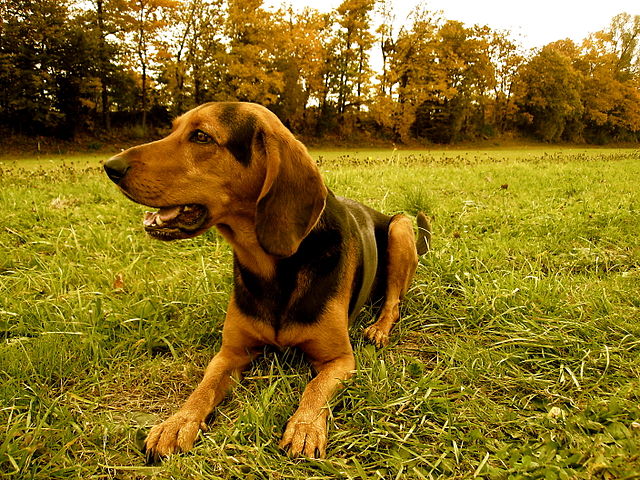The Hellenic Hound is an ancient scenthound developed in Greece for tracking and hunting hare. This explains his other name – the Greek Harehound. He has remained relatively unchanged in appearance for most of his existence (thousands of years!) as he is built purely for function. This medium-sized breed should appear strong, vigorous and slightly longer than tall. The coat is smooth yet dense, and always black and tan in color. The medium-length ears hang to the side of the head. The tail is high set and carried in a sabre fashion. Hellenic Hounds are a rare breed and, although recognized by the UKC, are very seldom seen outside of Greece. Although he is a gentle and loyal breed, he is a bit of a secret in the dog world. A prospective owner will likely have to dedicate lots of time to finding a breeder overseas.
The Hellenic is sociable and friendly with both people and other dogs, although his brave nature and slight tendency for being territorial means he won’t hesitate to bark at the arrival of strangers. This makes him a decent watch dog. With his owners, he is affectionate and loves to play. Overall this hound is level-headed and has an unmistakable zest for life and adventure, which he is apt to announce frequently with his beautiful (yet loud) voice! Those with close neighbors should take note…
Hellenic Hounds can be impulsive and stubborn – particularly when they catch the scent of an animal, so regular obedience training is recommended. They are intelligent yet independent and sometimes prone to dominance struggles. Adolescent males in particular can be frustrating for the novice handler to raise, which means they usually do best with experienced owners. This breed needs firm rules yet, at the same time, fair treatment as they don’t do well with harsh training techniques. Firm rules are important because if they don’t feel there is an obvious leader in the household they’ll try to fulfill that role themselves! Owners who are patient and knowledgeable in the art of raising scenthounds are best equipped to handle this slow-maturing hound. 
Hellenics are not a good match for those living in apartments. They need plenty of room to stretch their legs and run outdoors! Regular daily exercise is also important, and those that do not get it can become destructive and/or problematic barkers. Hunting excursions are fantastic for exercise, as this is what they were bred to do! As this breed needs a job to do, those that aren’t used for hunting they will need a substitute job of some sort. It should be noted that they are an equally bad match for those with small pets because of their high prey drive.
The Hellenic Hound can get along with children although requires older, well-behaved kids. Make sure to supervise the two together to ensure this hound doesn’t get teased or treated unfairly. Even better, assign responsible children with grooming duties to help build a bond with the dog! A weekly brushing (more frequent during seasonal shedding times) will help keep a shiny coat and a loving connection at the same time! This is an easy “starter coat” for a young person to work with, as the breed requires only infrequent baths. Make sure that ears are kept clean every week, however, as hanging ears are more prone to infection.
Ear infections aside, Hellenics are generally a very healthy breed, with no known health issues that are seen frequently in the breed. They are equally tough in the field as well, being fairly hardy overall and able to work in any terrain. The average lifespan is around 11 years and it is said that they are rarely ill. This hound tends to stay fairly active for most of his life, so while he can be well-behaved in the house, will still require exercise for the entirety of his years.
